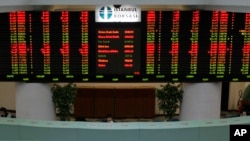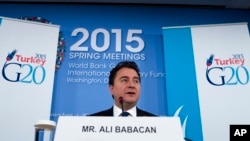The success of Turkey's AK Party in recent snap elections drew a positive response from financial markets. Analysts, however, are warning the markets are concerned about how the AKP will use its new political mandate.
The unexpected landslide victory by the AKP saw not only its supporters celebrating, but also the country’s financial markets.
The lira and stock markets surged after months of losses following political uncertainty after June’s election and the expectation Turkey was heading toward a coalition government.
Chief economist Inan Demir of the Istanbul-based Finansbank said the exuberance of the markets may be short-lived as they question the AKP's direction.
"Those questions are essentially about how [the] AKP performs after its strong election victory, how will they use the power at their hands right now going forward," Demir said.
Observers say the markets are nervous about concerns over whether President Recep Tayyip Erdogan and his advisers will increasingly wield more power over economic policy.
The president has strongly criticized central bank chief Erdem Basci, raising questions about the bank's independence as his advisers increasingly challenge market-friendly policies advocated by Finance Minister Ali Babacan.
Economist Demir said the markets are closely watching to see what happens to Babacan.
"If Ali Babacan is sidelined from the Cabinet, then the markets will be very concerned, and in April 2016 when the current term of the central bank governor is expiring, that appointment can also give significant signals,” Demir said. “Well, if those expectations are disappointed, then we should expect more negative reactions to come from the markets. The Turkish lira has been depreciating and it is one of the worst performing emerging market currencies."
Analysts say such uncertainty in the minds of international markets could add to further pressure on the lira. With the U.S. central bank expected to raise interest rates as early as next month, adding pressure to emerging market currencies, analysts warn Turkey’s political leaders will have to tread carefully.

